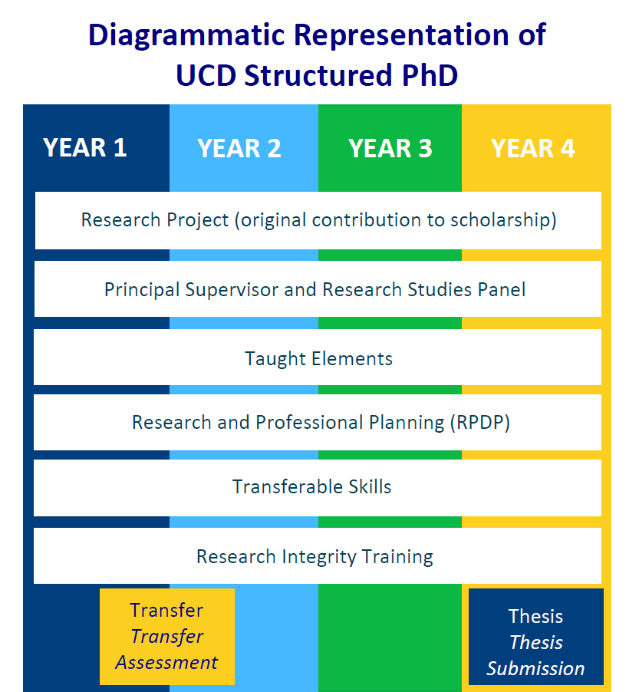Everyone has a different reason for embarking on a PhD in Modern Languages. For many, it starts out as a challenge and is sparked by a passion. It is essential to do a PhD on a topic that is of deep interest to you personally, as a human being. Being deeply curious and passionate about your topic will make the four years of serious application fascinating, and you will complete a more successful thesis. During your PhD programme, you will take on board the wisdom and experience of specialists already working in the field. Most PhD students become complete experts in their subject area and maintain this passion throughout their lives, regardless of future occupation. In our School, we also explore professors’ motivation for and experience of doing their own PhD during our series of Very Short Talks, in which staff share their own PhD trajectory with current students. Every story, everyone’s motivation, and every thesis is entirely unique.
PhD in Modern Languages
PhD in Modern Languages

Application Code: PhD Languages, Cultures and Linguistics Z129 (full-time) and Z130 (part-time)
The UCD PhD in Modern Languages is a three to four year research degree primarily involving the writing of a thesis dissertation (approx. 100,000 words, normally in English), which will make an original contribution to knowledge. At UCD, the PhD Modern Languages thesis is undertaken within the framework of a clearly structured PhD programme that includes: advanced taught modules; a Research and Professional Development Plan; thesis chapters drafted/completed, a Research Studies (advisory) Panel; and may include the possibility to develop teaching skills through lecturing or tutoring.
The PhD dissertation comprises original research in the student’s choice of research area in Modern Languages, as represented by staff within UCD. Modern Languages research specialisms and interests may be consulted on individual subject contact pages and researhc profiles. These specialisms include, but are not limited to, literature (early modern to contemporary), history of ideas, cultural studies, film studies, literary theory, translation, transnationalism, cultural theory, sociolinguistics and much more. Our language sections work with, and research through, the following world languages and their connected cultures: French; German; Italian; Portuguese; Spanish. Interdisciplinary and transdisciplinary projects are particularly welcome and PhD theses may involve UCD co-supervisors from another UCD School or College.
For information, please contact: sandrine.peraldi@ucd.ie (Head of Graduate Studies, SLCL)
For any technical and administrative help with the application, please contact (opens in a new window)slclgraduates@ucd.ie.
The structured PhD at UCD involves an element of course attendance. Taught modules are designed to prepare the candidate to be a more effective researcher, with a broader reach of awareness or reading on which to draw. Taught modules are on offer within the School of Languages, Cultures and Linguistics, but also at College and university levels. Students must take 30 taught credits (with up to 10 credits given for prior learning), but may take up to 90 taught credits during their PhD programme. Typically, Modern Languages students must take at least one module (10 credits) at School level and one or more (10 credits each) at College or university level.
Students undertake their PhD research under the guidance of one member of staff (supervisor), and they also enjoy a research advisory panel comprising the supervisor and at least two other co-supervisors. This Research Studies Panel (RSP) meets at least once a year (twice in the first year). After 18 months, each PhD candidate will submit work for a Transfer Assessment viva (STA). If the STA is successful, then the student is on course to complete thir PhD thesis. On completion of the original PhD thesis, students are normally ready to submit material for peer review to professional journals. After submission the PhD student must present and defend their thesis in front of an External and an Internal examiner in a viva exam.
The RPDP is a document specific to each student, in which they record modules taken, transferable skills acquired and reflect on preparing their future employability, whether within or outside academia. The RPDP is updated at each stage in the process, for example before any RSP or STA and at the end of each academic year.
Applicants to the PhD in Modern Languages will normally have taken a major (or modules) in their target language(s) as part of their primary Bachelors degree (BA or similar) and/or a Masters degree (MA, M.Litt. or similar). It is expected that applicants will already have completed their Masters degree that must include a significant thesis component, ideally in a cognate area, before application to a PhD programme. Our Modern Languages PhD candidates typically have proven strong graduate and postgraduate records with a high GPA (MA result of 2:1 or above). Where English is not a first language, a score of IELTS 7 is required by Modern Languages. A potential supervisor may be able to advise on the knowledge they will expect potential student to have gained before entry to the programme.
The UCD Structured PhD aims to enable PhD students to achieve the best possible experience of graduate research and training. Making a substantial and original contribution to knowledge, normally leading to peer-reviewed publications, remains the core objective of doctoral studies. The Structured PhD includes several innovative measures designed to support you in achieving your academic and professional objectives, which are outlined below.
Research Studies Panel (RSP)
SLCL will appoint a Research Studies Panel for you before you commence your PhD. The purpose of the Research Studies Panel is to support and enhance the supervisor-student relationship, to monitor your progress during the course of your doctoral studies and to provide advice and support both to you and your supervisor(s). See Link to Academic Regulations below for more information.
Research and Professional Development Plan (RPDP)
Research and professional development planning is an integral part of the Structured PhD programme at UCD. The purpose of such planning is to ensure that your work is clearly focused on achieving your research and professional development goals. This will play a major part in informing the trajectory of your PhD research and in your training and development as a researcher as we as in helping you to acquire transferable skills for work after your PhD. For further information on the RPDP please click here.
Transferable Skills Training
As a PhD graduate, your skill-set will naturally include the advanced research and analytical techniques required to undertake high level research in your field. You will also be expected to possess a range of transferable skills, relevant to the successful completion of your research project and to broader career development. Taught modules, online modules and workshops covering a wide range of transferable skills and research skills topics are available to assist you. Please visit Research Student Training and Development for further information.
Credits and Modules
Students will need to gain 30 credits through core and optional modules in the course of their PhD programme. One credit corresponds to 20-25 hours student effort. There is a large selection of modules available across the university, both discipline-specific modules to broaden and deepen your knowledge of your discipline and research skills modules to provide advanced training in relevant research methodologies. All modules will be selected in consultation with your Principal Supervisor.
Progression
Doctoral studies, which are normally completed by full-time students within four years, comprise two stages:
Stage 1 is a period when you define your research plan, develop your research skills and initiate original research work for your doctorate. For doctoral students progression from Stage 1 to Stage 2 normally occurs within the first 12-18 months (or 24-36 months for part-time students).
In order to move from Stage 1 to Stage 2 PhD students will need to successfully complete a transfer assessment following a minimum one calendar year period of registration to the Research degree programme and subject to any policy the University may establish. Further information and guidelines regarding doctoral programmes may be found in Sections 11 – 22 of the (opens in a new window)University Academic Regulations.
Stage 2 is primarily dedicated to continuing your original doctoral research but may also include some advanced education and training.
Further information can be found in Section 18 of the Academic Regulations.
Academic Regulations
The regulations governing the UCD Structured PhD Programme are available (opens in a new window)HERE
UCD Research Ethics
Regulations governing UCD Research Ethics are available HERE
Further Information
For further information, please contact the School's Director of Graduate Studies, Associate Professor Síofra Pierse at (opens in a new window)siofra.pierse@ucd.ie

Tuition fee information is available on the UCD Fees website: http://www.ucd.ie/students/fees/index.html
Fees are subject to change.
There will be no scholarships offered by SLCL available for 2020/21
Other scholarships can be found here:
Students who wish to apply for the PhD in Modern Languages at UCD must first identify a potential supervisor and contact them directly with their PhD project area. Before writing their PhD proposal, the candidate should have a preliminary discussion with their potential thesis supervisor in Modern Languages at UCD. Then they must prepare an application: this would normally involve a thesis proposal of approximately 1000-1500 words, including a substantial bibliography, a representative writing sample, a full CV, and two confidential academic references that must be sent directly to the potential supervisor.
Please find further detailed information on the School of Languages, Cultures and Linguistics (SLCL) application process HERE.